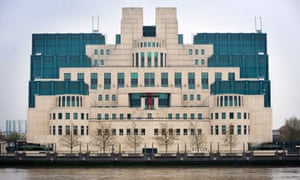
The UK’s overseas intelligence agency is to recruit hundreds more staff over the next four years in response to the pace of change in digital technology.
MI6, which employs 2,500 people at present, deals with intelligence-gathering and operations abroad, while MI5 is responsible for security within the UK.
The government announced last year that the security services would be given 1,900 additional staff – and MI6 is the main beneficiary. BBC’s Newsnight put the rise in staff for MI6 at 1,000 but it is believed to be fewer than that, though still substantial.
There is increasing reliance by worldwide intelligence agencies upon the internet, social media and changes such as facial recognition; rather than the running of agents as in the past.
One fear is that easier access to information, tracking and cross-checking can also be used against MI6 operatives.
The head of MI6, Alex Younger, speaking in Washington DC on Tuesday, said: “The information revolution fundamentally changes our operating environment. In five years’ time there will be two sorts of intelligence services: those that understand this fact and have prospered, and those that don’t and haven’t. And I’m determined that MI6 will be in the former category.
“The third and most important part of British intelligence is the surveillance agency GCHQ, which in partnership with the US National Security Agency, is responsible for scooping up most of the intelligence through tracking phone calls, emails, chat lines and other communications.”
Younger expressed concern about enemies also exploiting these new capabilities. He said: “Our opponents, who are unconstrained by conditions of lawfulness or proportionality, can use these capabilities to gain increasing visibility of our activities which means that we have to completely change the way that we do stuff.”
Both the NSA and GCHQ relied heavily on cooperation from the major internet companies but that relation was badly damaged by the revelations of the NSA whistleblower Edward Snowden in 2013. The internet companies not only faced a backlash from customers concerned about their privacy but were displeased on discovering that, in spite of their cooperation, the agencies were accessing their information anyway through backdoor channels.
Younger said: “I think that the real issue for us has been the effect that this has had on the levels of trust between the intelligence communities internationally and the technology community where I think that the right and proper response to the common threats that face us is through community of effort and teamwork between those different groups. And to the extent that those revelations damaged and undermined the trust that needs to exist, I think it is highly problematic.”
Asked about the threat posed by groups such as al-Qaida and Islamic State, Younger said: “I would like to be optimistic about this but we have got quite a long experience of this phenomenon now and I see it very much as the flip-side to some very deep-seated global trends, not least of all globalisation: the reduction of barriers between us.
“It’s a function also of the information revolution and the capacity for ideas to travel. It is fuelled by a deepening sectarian divide in the Middle East and there are some deep social economic and demographic drivers to the phenomenon that we know as terrorism. Allied with the emergence of state failure this means that, regrettably, this is an enduring issue which will certainly be with us, I believe, for our professional lifetime.”
At the conference, staged by the Central Intelligence Agency and George Washington University, Younger said increased cooperation between agencies and improvements in the way governments tackled terror were “doing a great deal to mitigate the threat”.
https://www.theguardian.com/uk-news/2016/sep/21/mi6-recruit-digital-internet-social-media

No comments:
Post a Comment